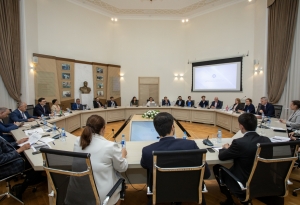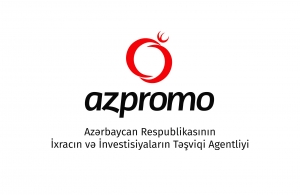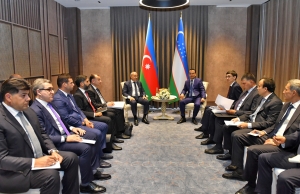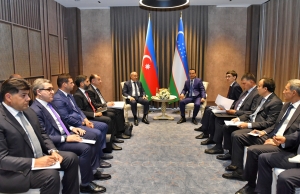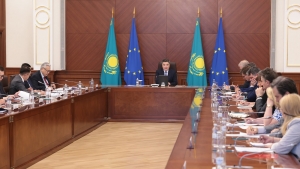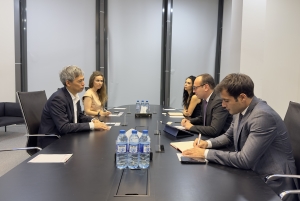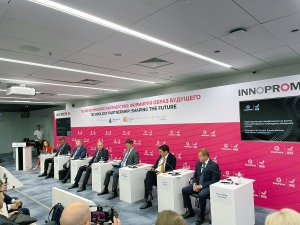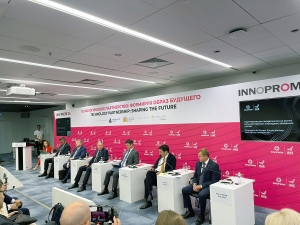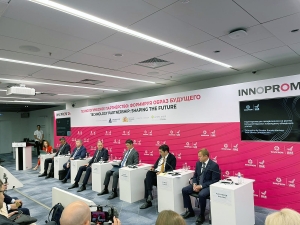Super User
Azərbaycanda yaşıl enerjiyə keçid mövzusunda dəyirmi masa təşkil olunub
Energetika Nazirliyində nazir müavini Orxan Zeynalovun iştirakı ilə Böyük Britaniya və Şimali İrlandiya Birləşmiş Krallığının Enerji Təhlükəsizliyi və Xalis Sıfır İdarəsi arasında “Azərbaycanda yaşıl enerjiyə keçid” mövzusunda dəyirmi masa təşkil olunub.
Caspian Energy Media nazirliyə istinadən xəbər verir ki, dəyirmi masada Azərbaycanda bərpa olunan enerji mənbələri, dekarbonizasiya, enerji səmərəliliyi sahəsində hazırkı vəziyyət, həyata keçirilən cari layihələr barədə qarşı tərəfə məlumat verilib, Azərbaycan və Böyük Britaniya arasında bərpa olunan enerji, xüsusilə yaşıl hidrogen istehsalı, həmçinin enerji səmərəliliyi, elektrik şəbəkələrinin gücləndirilməsi üzrə əməkdaşlığa dair növbəti addımlar müzakirə edilib.
Tədbirdə Energetika Nazirliyi, nazirlik yanında Bərpa Olunan Enerji Mənbələri Dövlət Agentliyi, nazirliyin tabeliyində Enerji Məsələlərini Tənzimləmə Agentliyi, həmçinin “Azərenerji” ASC, “Azərişıq” ASC, SOCAR və bp şirkətlərinin nümayəndələri iştirak edib.
Bursa Ticarət və Sənaye Palatasının nümayəndələri ilə görüş keçirilib
Ölkəmizdə səfərdə olan Türkiyənin Bursa Ticarət və Sənaye Palatasının nümayəndə heyəti və qida sektorunda fəaliyyət göstərən iş adamları ilə Kiçik və Orta Biznesin İnkişafı Agentliyində (KOBİA) görüş keçirilib.
Caspian Energy Media KOBİA-ya istinadən xəbər verir ki, görüşdə Azərbaycan və Türkiyə, o cümlədən Bursa iş adamları arasında biznes və investisiya sahələrində əməkdaşlıq, həmçinin yerli KOB-larla əlaqələrin genişləndirilməsi barədə fikir mübadiləsi aparılıb.
Rusiyada müəyyən növ məhsulların məcburi etiketlənməsi tətbiq ediləcək
Hörmətli sahibkarlar, Rusiya Federasiyasında 2024-cü il sentyabrın 1-dən etibarən müəyyən növ məhsulların, o cümlədən konservlərin, bitki yağlarının və alkoqolsuz pivənin məcburi etiketlənməsi tətbiq ediləcəkdir. Rusiya hökuməti etiketləmə qaydalarını və son tarixləri təsdiqləyib.
Caspian Energy Media AZPROMO-ya istinadla xəbər verir ki, məhsulların dövriyyədən çıxarılması ilə bağlı məlumat 2026-cı il oktyabrın 1-dən verilməlidir.
Azərbaycan-Özbəkistan Hökumətlərarası Komissiyasının 13-cü iclası keçirilib
Caspian Energy Media İqtisadiyyat Nazirliyinə istinadən xəbər verir ki, iqtisadiyyat naziri Mikayıl Cabbarovun rəhbərlik etdiyi nümayəndə heyətinin Özbəkistana səfəri çərçivəsində Azərbaycanla bu ölkə arasında əməkdaşlıq üzrə Birgə Hökumətlərarası Komissiyanın 13-cü iclası keçirilib.
Məlumata görə, Hökumətlərarası Komissiyanın həmsədrləri Mikayıl Cabbarovla Özbəkistanın investisiyalar, sənaye və ticarət naziri Ləziz Kudratov Komissiyanın işgüzar münasibətlərin inkişafı və birgə layihələrin icra edilməsi üçün səmərəli platforma olduğunu vurğulayıblar.
Qeyd olunub ki, ticarət sahəsində əməkdaşlıq Özbəkistanla iqtisadi münasibətlərdə əsas istiqamətlərdəndir.
Азербайджан и Узбекистан провели 13-е заседание межправительственной комиссии
Как сообщает Caspian Energy Media со ссылкой на Министерство экономики,В Бухаре состоялось 13-е заседание совместной межправительственной комиссии по сотрудничеству между Азербайджаном и Узбекистаном.
Сопредседатели комиссии, министр экономики Азербайджана Микаил Джаббаров и министр инвестиций, промышленности и торговли Узбекистана Лазиз Кудратов подчеркнули, что комиссия является эффективной платформой для развития деловых связей и реализации совместных проектов.
Было отмечено, что двустороннее торговое сотрудничество является основным направлением экономических отношений.
Казахстан и ЕС обсудили перспективы логистического сотрудничества
Под председательством Премьер-Министра Казахстана Олжаса Бектенова состоялось 15-е заседание диалоговой платформы «Казахстан-Евросоюз» с участием Посла Представительства Европейского Союза в РК Кестутиса Янкаускаса и глав дипломатических миссий стран ЕС.
В частности, обсуждены планы по развитию Транскаспийского международного транспортного маршрута (ТМТМ) как одного из наиболее перспективных направлений.
Через Казахстан, который является транзитным хабом между Европой и Азией, перевозится около 85% товаров из Китая в страны ЕС. ТМТМ предоставляет наиболее конкурентоспособный срок доставки (12-15 суток), обеспечивая максимальную привлекательность для торговых потоков.
На заседании диалоговой платформы были рассмотрены вопросы расширения и укрепления торгово-экономического, инвестиционного взаимодействия и совместной реализации проектов в сфере транспорта и логистики.
Об сообщает Caspian Energy Media со ссылкой на сообщение пресс-службы правительства Казахстана.
AZPROMO-da JETRO ilə görüş keçirilib
Yaponiyanın Xarici Ticarət Təşkilatının (JETRO) İstanbul ofisinin idarəedici direktoru Mutsuaki Sano İxracın və İnvestisiyaların Təşviqi Agentliyində – AZPROMO-da olub.
Caspian Energy Media AZPROMO-ya istinadla xəbər verir ki, görüşdə qeyd edilib ki, bu ilin mart ayında AZPROMO-nun təşkilatçılığı ilə 11 Azərbaycan şirkəti "FOODEX Japan 2024" sərgisində "Made in Azerbaijan" vahid ölkə stendi altında yerli məhsulları təqdim edib.
Bununla yanaşı, Yaponiyaya ixrac imkanları və investisiya tərəfdaşlığı müzakirə olunub.
Azerbaijan represented at the INNOPROM - 2024 exhibition
Azerbaijan was represented at the INNOPROM - 2024 international exhibition held in Yekaterinburg, Russia.
Caspian Energy Media informs, citing Azerbaijan’s Ministry of Economy, that a business session on “Partnership for Promotion to the Markets of Greater Eurasia: We Win by Joining Forces.” was held within the framework of the exhibition.
At the event, the mechanisms used in Azerbaijan to stimulate the activity of foreign companies in the country’s market and to increase bilateral trade were brought to the attention. The event highlighted opportunities created by investment projects implemented jointly with partner countries in industrial zones and transport and logistics initiatives.
Азербайджан представлен на выставке İNNOPROM-2024
Азербайджан представлен на международной выставке İNNOPROM-2024 в Екатеринбурге (Россия).
Как сообщает Caspian Energy Media со ссылкой на Министерство экономики, в рамках выставки прошла бизнес-сессия на тему "Партнерство для выхода на крупные евразийские рынки: Побеждаем, объединяя усилия".
На сессии были представлены механизмы, используемые в Азербайджане для стимулирования деятельности иностранных компаний на местном рынке и увеличения двусторонней торговли, также обсуждены вопросы многостороннего сотрудничества.
Azərbaycan “İNNOPROM-2024” sərgisində təmsil olunub
Azərbaycan Rusiyanın Yekaterinburq şəhərində keçirilmiş "INNOPROM – 2024" beynəlxalq sərgisində təmsil olunub.
Caspian Energy Media İqtisadiyyat Nazirliyinə istinadən xəbər verir ki, sərgi çərçivəsində "Böyük Avrasiya bazarlarına çıxmaq uğrunda tərəfdaşlıq: səyləri birləşdirərək qalib gəlirik" mövzusunda işgüzar sessiya keçirilib
Tədbirdə xarici şirkətlərin Azərbaycan bazarında fəaliyyətinin stimullaşdırılması və ikitərəfli ticarətin artırılması üçün ölkəmizdə tətbiq olunan mexanizmlər diqqətə çatdırılıb. Sənaye zonalarında tərəfdaş ölkələrlə birgə reallaşdırılan investisiya layihələrinin, nəqliyyat-logistika sahəsində təşəbbüslərin yaratdığı imkanlar vurğulanıb.




